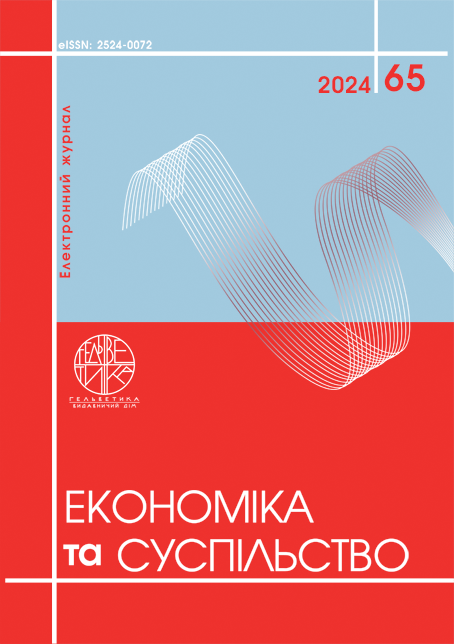DIGITAL TRANSFORMATION IN THE CONTEXT OF HYBRID THREATS
Abstract
Digital transformation is one of the key trends in the modern world, which has a significant impact on all spheres of life: economy, society, public administration, defense and security. The United Nations recognizes digitalization as one of the main dangers facing humanity. In the article the main risks to society posed by digital transformation are identified. The threats of economic, political, social, technological, and control nature are characterized. The development of Emerging and Disruptive Technologies - EDTs, such as artificial intelligence, blockchain, quantum computing, 5G/6G, Big Data, the Internet of Things, and others, should be assessed from both a positive and negative perspective in terms of their impact on society and the economy. It is determined that information technologies have become one of the main tools of hybrid threats. Artificial intelligence (AI) is a rapidly developing area of technologies with potentially significant implications for national security. The stages of development of AI technologies and the areas of potential impact of AI on the development of defense capabilities of countries over the next 20 years are characterized. Digital transformation significantly increases the risks of hybrid threats. Due to the rapid development of information technology, hybrid threats can cause significant damage at the national and international levels. For example, cyber attacks on critical infrastructure can lead to serious disruptions in the functioning of the state, disinformation can provoke social conflicts, and economic pressure can undermine the resilience of economies. All these factors create new challenges for national security and require new approaches to neutralize them. To successfully counter hybrid threats caused by the digital transformation process, it is necessary to develop and implement comprehensive strategies that combine cybersecurity, countering disinformation, strengthening national resilience and international cooperation. This is the only way to ensure security and stability in the digital age.
References
Хаустов М., Бондаренко Д. Цифровізація: здобутки та загрози для суспільства. InterConf, 2021. №51. С 49–58. URL: https://ojs.ukrlogos.in.ua/index.php/interconf/article/view/11577 (дата звернення: 21.07.2024)
Хаустова В. Є., Решетняк О. І., Хаустов М. М., Зінченко В. А. Напрямки розвитку технологій штучного інтелекту в забезпеченні обороноздатності країни. Бізнес Інформ. 2022. №3. C. 17–26. DOI: https://doi.org/10.32983/2222-4459-2022-3-17-26 (дата звернення: 26.06.2024)
Цифрова економіка: тренди, ризики та соціальні детермінанти / Центр Разумкова. Київ : Видавництво “Заповіт”, 2020. 274 с. URL: https://razumkov.org.ua/uploads/article/2020_digitalization.pdf (дата звернення: 05.08.2024)
Хаустова В. Є., Решетняк О. І., Хаустов М. М. Перспективні напрямки розвитку IT-сфери в світі. Проблеми економіки. 2022. №1. C. 3–19. DOI: https://doi.org/10.32983/2222-0712-2022-1-3-19 (дата звернення: 29.07.2024)
Key Issues for Digital Transformation in the G20. Report Prepared for a Joint G20 German Presidency. OECD, 12 January 2017. URL: https://www.oecd.org/g20/key-issues-for-digital-transformation-in-the-g20.pdf (дата звернення: 22.07.2024)
UN chief outlines solutions to defeat ‘four horsemen’ threatening our global future. – UN News, 22 January 2020. URL: https://news.un.org/en/story/2020/01/1055791
Fiott D. Digitalization and hybrid threats: Assessing the vulnerabilities for European security. Hybrid CoE Paper 13. URL: https://www.hybridcoe.fi/wp-content/uploads/2022/04/20220404-Hybrid-CoE-Paper-13-Digitalization-and-hybrid-threats-WEB.pdf (дата звернення: 25.07.2024)
Mazzucchi N. AI-based technologies in hybrid conflict: The future of influence operations. Hybrid CoE Paper 14. URL: https://www.hybridcoe.fi/wp-content/uploads/2022/06/20220623-Hybrid-CoE-Paper-14-AI-based-technologies-WEB.pdf (дата звернення: 15.07.2024)
Artificial Intelligence and National Security / Congressional Research Service. November 10, 2020. URL: https://sgp.fas.org/crs/natsec/R45178.pdf (дата звернення: 29.07.2024)
Reding D. F., Eaton J. Science & Technology Trends 2020–2040. Exploring the S&T Edge / NATO Science & Technology Organization. Office of the Chief Scientist, Brussels, Belgium. URL: https://www.nato.int/nato_static_fl2014/assets/pdf/2020/4/pdf/190422-ST_Tech_Trends_Report_2020-2040.pdf (дата звернення: 17.07.2024)
Khaustov M., Bondarenko D. (2021) Tsyfrovizatsiia: zdobutky ta zahrozy dlia suspilstva [Digitalization: achievements and threats to society]. InterConf. №51. S. 49-58. URL: https://ojs.ukrlogos.in.ua/index.php/interconf/article/view/11577 (accessed July 21, 2024)
Khaustova V. Ye., Reshetniak O. I., Khaustov M. M., Zinchenko V. A. (2022) Napriamky rozvytku tekhnolohii shtuchnoho intelektu v zabezpechenni oboronozdatnosti krainy [Directions of Development of Artificial Intelligence Technologies in Ensuring the Country’s Defense Capability]. Biznes Inform. №3. S. 17–26. DOI: https://doi.org/10.32983/2222-4459-2022-3-17-26 (accessed June 26, 2024)
Tsyfrova ekonomika: trendy, ryzyky ta sotsialni determinant (2020) [Digital economy: trends, risks and social determinants] / Tsentr Razumkova. Kyiv : Vydavnytstvo “Zapovit”, 274 p. Available at: https://razumkov.org.ua/uploads/article/2020_digitalization.pdf (accessed August 5, 2024)
Khaustova V. Ye., Reshetniak O. I., Khaustov M. M. (2022) Perspektyvni napriamky rozvytku IT-sfery v sviti [Promising Areas of IT Development in the World]. Problemy ekonomiky. №1. pp. 3–19. DOI: https://doi.org/10.32983/2222-0712-2022-1-3-19 (accessed July 29, 2024)
Key Issues for Digital Transformation in the G20. Report Prepared for a Joint G20 German Presidency. OECD, 12 January 2017. Available at: https://www.oecd.org/g20/key-issues-for-digital-transformation-in-the-g20.pdf (accessed July 22, 2024)
UN chief outlines solutions to defeat ‘four horsemen’ threatening our global future. UN News, 22 January 2020. Available at: https://news.un.org/en/story/2020/01/1055791
Fiott D. (2022) Digitalization and hybrid threats: Assessing the vulnerabilities for European security. Hybrid CoE Paper 13. Available at: https://www.hybridcoe.fi/wp-content/uploads/2022/04/20220404-Hybrid-CoE-Paper-13-Digitalization-and-hybrid-threats-WEB.pdf (accessed July 25, 2024)
Mazzucchi N. (2022) AI-based technologies in hybrid conflict: The future of influence operations. Hybrid CoE Paper 14. URL: https://www.hybridcoe.fi/wp-content/uploads/2022/06/20220623-Hybrid-CoE-Paper-14-AI-based-technologies-WEB.pdf (accessed July 15, 2024)
Artificial Intelligence and National Security / Congressional Research Service. November 10, 2020. URL: https://sgp.fas.org/crs/natsec/R45178.pdf (accessed July 29, 2024)
Reding D. F., Eaton J. Science & Technology Trends 2020–2040. Exploring the S&T Edge / NATO Science & Technology Organization. Office of the Chief Scientist, Brussels, Belgium. Available at: https://www.nato.int/nato_static_fl2014/assets/pdf/2020/4/pdf/190422-ST_Tech_Trends_Report_2020-2040.pdf (accessed July 17, 2024)

This work is licensed under a Creative Commons Attribution 4.0 International License.


